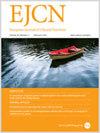禁食和禁饮 12 小时后,尽管血液和尿液中的水合标志物发生了变化,但血浆和血清容积仍保持不变。
IF 3.6
3区 医学
Q2 NUTRITION & DIETETICS
引用次数: 0
摘要
背景/目的:轻度脱水对血浆和血清容量的影响尚未完全确定。此外,尿液和血液生物标志物监测微小水合变化的能力也尚未得到证实。本研究有两个目标:1.确定轻度脱水是否会影响血浆和血清容量;2. 确定尿液或血液生物标记物是否能更好地检测轻度脱水。研究对象/方法:共招募了 47 名研究对象,其中 10 名研究对象退出了研究,37 名研究对象(27% 为男性)完成了研究。这是一项交叉研究设计,每个受试者都按照平衡顺序接受了所有方案。方案包括 12 小时脱水、12 小时水合和对照:血浆容量(p = 0.914)、血浆容量状态(p = 0.649)和血清容量(p = 0.273)在不同方案中均无差异。体重(p脱水不会影响血浆或血清容量。因此,在本研究中禁食禁水 12 小时可能不会影响生物标志物浓度的实验室检测结果。所有 3 种尿液检测指标都能检测出水合状态的变化,而只有 2 种血液检测指标能检测出水合状态的变化。这可能表明,尿液测量最擅长检测水合状态的微小变化。本文章由计算机程序翻译,如有差异,请以英文原文为准。

Plasma and serum volume remain unchanged following a 12-h fast from food and drink despite changes in blood and urinary hydration markers
The effect of mild dehydration on plasma and serum volume has not been well established. Furthermore, the ability of urinary and blood biomarkers to monitor small hydration changes have not been solidified. There were two objectives of this research: 1. Determine if mild dehydration affects plasma and serum volume; 2. Determine if mild dehydration can be detected better by urinary or blood biomarkers. 47 subjects were recruited; 10 subjects were removed from the study and 37 subjects (27% male) completed the study. This was a crossover study design such that each subject underwent all protocols in a counterbalanced order. Protocols consisted of 12-h dehydration, 12-h hydration, and control. Neither plasma volume (p = 0.914), plasma volume status (p = 0.649), nor serum volume (p = 0.273) were different among protocols. Body mass (p < 0.001) was lower following the dehydration protocol. Urine color (p < 0.001), urine osmolality (p < 0.001), urine specific gravity (p < 0.001), serum osmolality (p < 0.001), and plasma osmolality (p < 0.001) were all lower following the hydration protocol. Hematocrit (p = 0.842) and hemoglobin concentration (p = 0.558) were not different among protocols. Dehydration did not affect plasma or serum volume. Therefore, a 12-h fast from food and water as done in this study will not likely affect laboratory test results of biomarker concentration. All 3 urinary measures were able to detect changes in hydration status, whereas only 2 blood measures were able to detect changes in hydration status. This may indicate that urinary measures are best at detecting small changes in hydration status.
求助全文
通过发布文献求助,成功后即可免费获取论文全文。
去求助
来源期刊
CiteScore
10.60
自引率
2.10%
发文量
189
审稿时长
3-6 weeks
期刊介绍:
The European Journal of Clinical Nutrition (EJCN) is an international, peer-reviewed journal covering all aspects of human and clinical nutrition. The journal welcomes original research, reviews, case reports and brief communications based on clinical, metabolic and epidemiological studies that describe methodologies, mechanisms, associations and benefits of nutritional interventions for clinical disease and health promotion.
Topics of interest include but are not limited to:
Nutrition and Health (including climate and ecological aspects)
Metabolism & Metabolomics
Genomics and personalized strategies in nutrition
Nutrition during the early life cycle
Health issues and nutrition in the elderly
Phenotyping in clinical nutrition
Nutrition in acute and chronic diseases
The double burden of ''malnutrition'': Under-nutrition and Obesity
Prevention of Non Communicable Diseases (NCD)

 求助内容:
求助内容: 应助结果提醒方式:
应助结果提醒方式:


